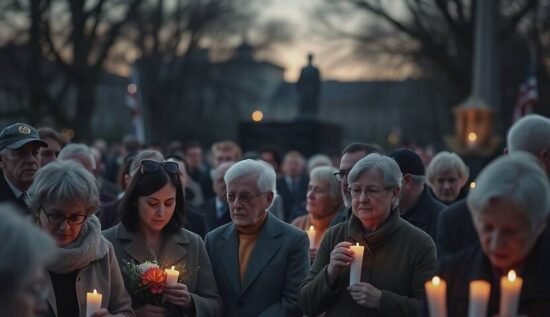New Year’s Day saw a solution to the controversy surrounding the removal of thousands of candles from the Waldfriedhof Halbe and other cemeteries in Germany. Following a call by the AfD’s top candidate, Dr. Hans-Christoph Berndt, around 200 to 300 people gathered at the cemetery on Wednesday afternoon and partially restored the war graves with LED candles.
The original initiative, which had placed around 5,500 LED candles on the graves on December 21, had no organizational involvement in the new action. The initiative’s creator, who wishes to remain anonymous, expressed mixed feelings about the AfD’s action, stating that they had wanted to keep the remembrance apolitical and achieve normalcy.
The creator, who is not affiliated with the “Volksbund Deutsche Kriegsgräberfürsorge” and has concerns about potential political persecution, emphasized the importance of a non-political remembrance for all, including those who are not affiliated with a political group.
The AfD’s Fraktionschef, Dr. Hans-Christoph Berndt, was pleased with the large turnout and described the event as a “spontaneous expression of anger over the removal of the graves.” He thanked his party colleague, Daniel Freiherr von Lützow, and the police in Brandenburg for quickly resolving the initial misunderstandings.
The police initially suspected the event was a gathering, which is prohibited on cemeteries in Brandenburg, following a right-wing extremist march in the 1990s. After a meeting with several AfD politicians, the authorities allowed the participants to enter the cemetery in small groups with certain conditions.
Daniel Freiherr von Lützow, an AfD politician and former Bundeswehr soldier, explained his engagement in honoring the war dead, promising to keep his grandfather’s memory alive, who was taken prisoner by the Soviet Union during the Battle of Halbe. He stated that the AfD is the only political force that takes the issue seriously, emphasizing the party’s commitment to tradition and values.
The University of Jena commented on the events at the Waldfriedhof Halbe, stating that the main motivation for the breakout attempts from the Kessel of Halbe was the fear of Soviet war captivity, not the support of the regime. The university criticized the AfD’s action, saying it was a form of historical revisionism and ideological appropriation, aiming to separate the ideology of National Socialism from its political practice, which included the war of conquest and extermination.
The university concluded that the seemingly harmless “remembrance of the ancestors” was actually a way to disconnect the Nazi regime’s ideology from its political actions, allowing for a sanitized identification with the German past that only knows heroic soldiers and innocent victims, but not perpetrators and criminals.





